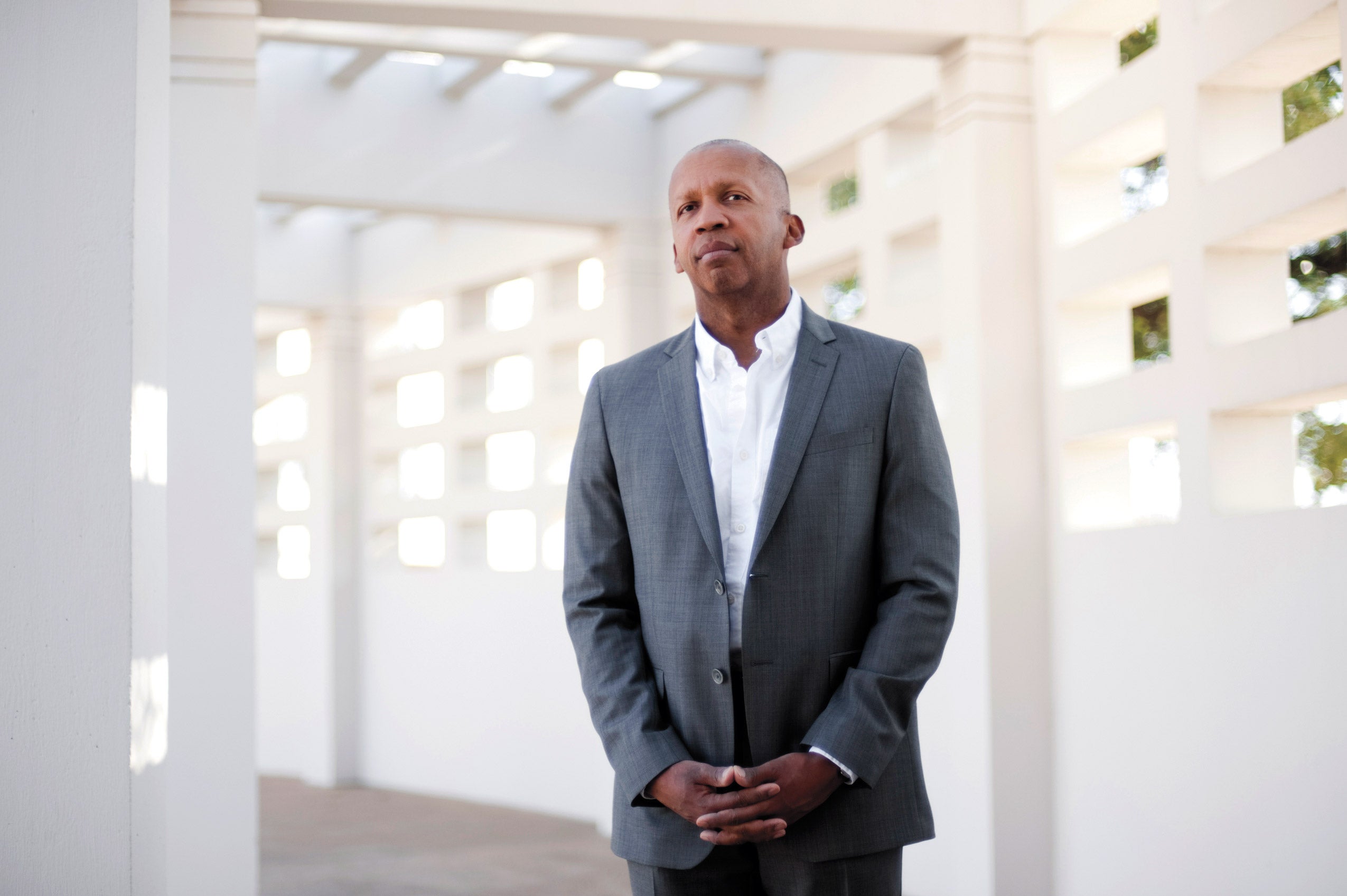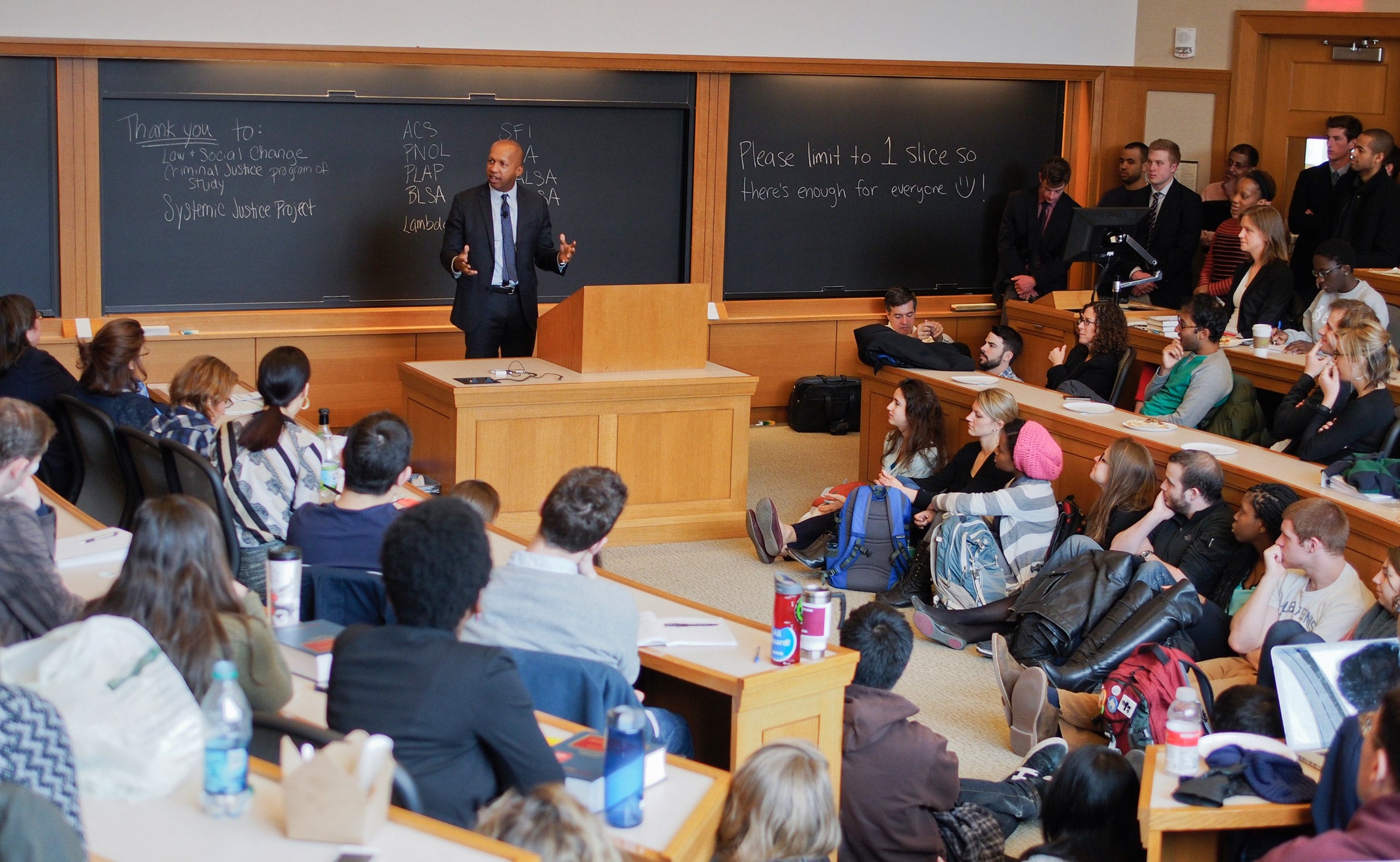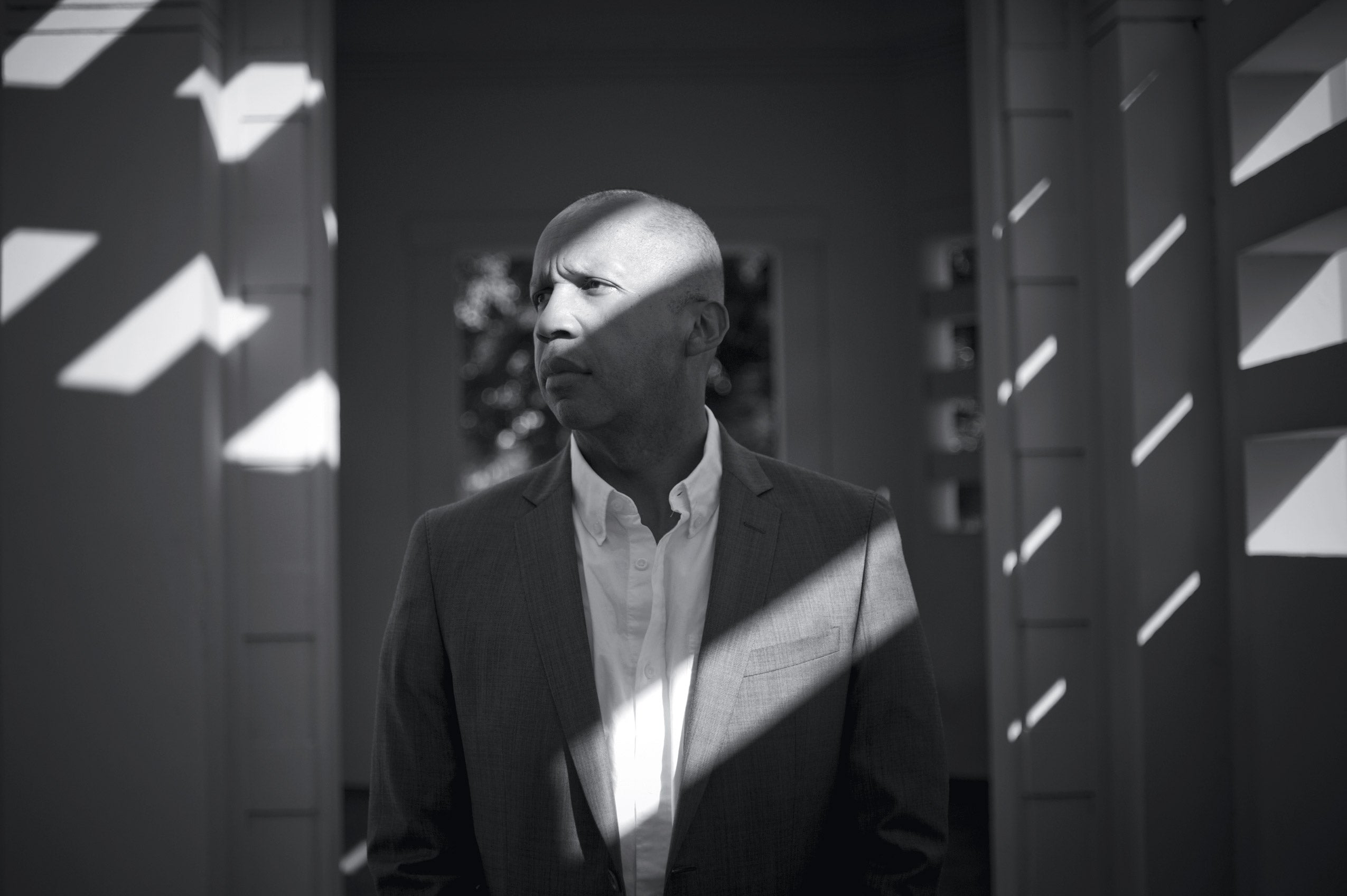Early in his career, Bryan Stevenson spoke at a small church in rural Alabama. Throughout the talk, he kept noticing an old man in the back, staring at him severely. Afterward, people praised Stevenson and came up to shake his hand. Then the old man approached and pointed a finger in Stevenson’s face.
“Do you know what you’re doing?” the man asked.
Stevenson didn’t know what to say.
“Do you know what you’re doing?” the man asked a second time.
Stevenson could only mumble.
“I’ll tell you what you’re doing,” the man said. “You’re beating the drum for justice. You keep beating the drum for justice.”
Stevenson has beat the drum for justice ever since. And he has been heard.
The 55-year-old lawyer graduated from Harvard Law School and Harvard Kennedy School in 1985, practiced for four years with the Southern Prisoners Defense Committee, and then founded the Equal Justice Initiative in Montgomery, Alabama, in 1989. Initially focused on providing free legal help to death-row inmates in Alabama, EJI has grown to tackle life sentences for juvenile offenders, paltry access to legal help for poor defendants, racial bias in the criminal process, and the history of racial and economic inequality in America. Along the way, Stevenson has been named a MacArthur Fellow, joined the faculty at N.Y.U. School of Law, won the Olof Palme Prize for international human rights and, in the fall, published the award-winning memoir “Just Mercy.”
Contemplating the yardstick of a lawyer’s success in an interview with the Harvard Law Bulletin, Stevenson recalled the man in the church, who had turned his head and shown Stevenson his scars, one by one—the wounds he had suffered at Greene County, Alabama; and during the Children’s Crusade in Birmingham; and during Freedom Summer in Mississippi. He had dubbed them his “medals of honor.”

“There’s another metric system when you’re trying to achieve justice,” Stevenson argues. “And it’s not measured by how much money you make, or how many cases you win, or any of those things. It’s measured by how much you fight for the things that someone has to fight for.”
Bulletin: You write about feeling “disconnected” and “disillusioned” during your time at HLS.
Stevenson: I think a lot of my alienation had to do with my lack of familiarity with lawyers and the law. I started my education in the colored school, because black kids weren’t permitted to attend the public school. And I’d heard about lawyers coming into our community and making them open up the public schools for kids like me. And that narrative was absolutely a formative one, but I’d actually never met a lawyer.
So when I showed up at Harvard, I was dazzled by the different kinds of people, and I was very excited. And my motivation was to do something about racial inequality, about poverty, and about the injustice that I had witnessed. And it just didn’t seem like—in those first few weeks—anybody was talking about race. It didn’t seem like anybody was talking about poverty. It didn’t even seem like anybody was talking about justice.
I think, in retrospect, when you talk about civil procedure, contracts, criminal law, there is—behind the discourse—a very real conversation about race, and poverty, and justice. But it wasn’t visible to me at that time—and it wasn’t highlighted, in all candor.
Has that changed?
I think it’s changed a lot. This was before there was clinical legal education. This was before you had as many faculty members with practice as part of their background. Back in those days, I think there was real skepticism about having people teach who had actually practiced law. Now that’s changed, and I think the advent of clinical legal education has really changed the culture of legal education generally.
You’ve got students now talking about meeting clients, or going into court, or working with low-income communities. And even before I graduated, I got involved with [HLS Professor] Gary Bellow and the legal aid work that he was doing. Spending time in Jamaica Plain working with low-income residents transformed my interest in the law. Being able to connect civil procedure, and criminal law, and contracts, and constitutional law to contemporary struggles was really important in shaping my interest in the law.
I went to Georgia, spent a month meeting people on death row—people literally dying for legal assistance. And when you meet somebody who is desperately trying to get to higher ground, and is counting on you to help them get there, it will change your relationship to law study. So when I got back to Harvard, you couldn’t get me out of the law library. I was in Langdell morning till night trying to figure out how constitutional law principles would apply, how civil procedure would work—all of these constructs and abstract concerns became meaningful and personal.
In “Just Mercy,” you tell a story about getting to sit with [storied civil rights activists] Rosa Parks, Virginia Durr, and Johnnie Carr, and talk about EJI with them. At the end, Ms. Carr tells you, “You’re going to have to be brave, brave, brave.” When have you most needed that advice?
Whenever you take on something new and different, it’s scary. And the downside to public interest work, in too many places, is that there is no accountability. If you do very little, nobody will fault you. If you decide to just do the same thing all the time, nobody will fault you. There’s not the same metric of success that’s forced on you when you’re in other sectors.
We’re now doing this major project on race and poverty. It’s the first project we’ve done that’s not specific to the criminal justice system. And it was, in a lot of ways, the boldest choice we could make—to take on something broad and expansive. But five years in, I am super pleased that we’ve taken it on. We just issued this lynching report, and we’ve been inundated with hundreds of requests from people who want to engage with us on America’s legacy of racial terror—these lynchings that we’ve documented in all of these states.
“We talk too superficially about civil rights. We just want to talk about the heroes.”
Given that legacy, is reconciliation possible, on a national scale, in America?
I think one of the great challenges we have in our criminal justice system today is that there are too many people in our society burdened with the presumption of dangerousness and guilt that has been born out of our attitudes around race. And those attitudes persist because we haven’t dealt honestly with the legacy of racial inequality. We haven’t talked enough about slavery, and what it did to us. We haven’t talked enough about lynching. We talk too superficially about civil rights—we just want to talk about the heroes, and the leaders, and the celebrations, and the extraordinary things that were accomplished by people, but we haven’t talked about the humiliation, and the damage that was done to lots of people, day in and day out.
And so to get to that place of hopefulness, I do think you have to keep telling the truth about the challenges that our history has created. But when you do that, you see some wonderful, amazing things. And I’ve certainly had the privilege of seeing people I never expected take a step forward. And those steps make me believe that we can all collectively move forward, when we commit ourselves in a meaningful way to dealing with the legacy of our history of inequality and injustice, in a sober and thoughtful way.
When have you most felt like giving up?
You know, when you represent people on death row and you don’t succeed, it is surreal. You’re talking to an otherwise healthy human being who is about to be executed by your state government, through a process that may be torturous. So it’s just really difficult to reconcile yourself with that reality.

My first execution was in 1989. Back in those days, they were still executing people with the electric chair. And I remember being a young lawyer, desperately trying to get a stay of execution. And I was shocked when the Supreme Court denied our last stay motion. And I sat there stunned at the realization that this man whom I’d been working with was going to be executed. And it was something that I was completely unprepared for. All of the emotions, the dynamics—the confusing spectacle of having someone pulled away, and strapped in an electric chair, and then killed in front of you.
And the most difficult thing for me was the conversation I had with this man, where we were standing there and he was telling me about his day. You know, they would shave all the hair off your body to make you a more efficient conductor of the electricity that would kill you. And it was so humiliating for this man to be shaved by these officers in this way.
But then he started telling me about how strangely the officers had been interacting with him. And he said that when he woke up that morning, the guards came to him and said, “What do you want for breakfast?”
And they were bending over backward all day to ask him how they could help: “What do you want for lunch? Can we get you the phone to call your family? Do you want stamps to mail your last letters? Can we get you some water? Can we get you some coffee? What do you want for your last meal? How can we help you?”
And I’ve never forgotten how that man looked at me in the last few minutes. He said, “Bryan, it’s been such a strange day.” He said, “More people have asked me, ‘What can I do to help you?’ in the last 14 hours of my life than they ever did in the first 19 years of my life.”
And, holding that man’s hand, I couldn’t help but think, Yes, but where were they when you were 3 years old, and you were being abused? Where were they when you were 7, and you were struggling, and suffering? Where were they when you were a young teenager, experimenting with drugs and alcohol? Where were they when you returned home after serving in Vietnam, traumatized, and mentally disabled, and on the edge of behaviors that would result in this violent crime?
And that disconnect was pretty stunning. I left the prison questioning whether this was something I could do ever again.
How do you keep going?
You begin to realize that you’ve got to stand, even if you stand by yourself. You’ve got to speak, even if everybody else is quiet, because not standing—not speaking—injures you in a way much more profound, much more devastating, much more consequential than fighting, even if the fighting is hard and uncomfortable. And that’s what I’ve learned from the people who have fought before me in places like Montgomery.
My grandmother was the daughter of enslaved people, and I think about them when we have really difficult days. Slavery wasn’t an evil defined by involuntary servitude—it was an evil defined by this ideology of racial difference, this narrative of racial difference that allowed people to believe that if you’re black, you’re not fully human, you’re not as smart as the others, you’re not hardworking. And that destructive ideology of white supremacy was the real evil of slavery, and we never really addressed that evil. The 13th Amendment doesn’t deal with that narrative.
And that’s why I contend slavery didn’t end—it just evolved. It turned into this era of terrorism, and violence, and lynching, and convict leasing, and then Jim Crow, and segregation. And in each of those eras people had to deal with unconscionable challenges. Losing your loved one to a torturous lynching that the entire community celebrates in some public spectacle—that would be devastating. And yet people survived that, fought that, continued to challenge that. And even in the civil rights era, the lawyers who won my opportunity to go to a public school, and graduate, and go to college, had to encounter all kinds of challenges, with far fewer resources, with far less certainty that there would be safety for them.
You know, I’ve been doing this work a really long time, but unlike my predecessors, I’ve never had to say, “My head is bloody, but not bowed.” And when you think about that history, you begin to find your courage. You begin to recognize that as difficult as things become, you can, and you should, do what must be done to sustain justice.
